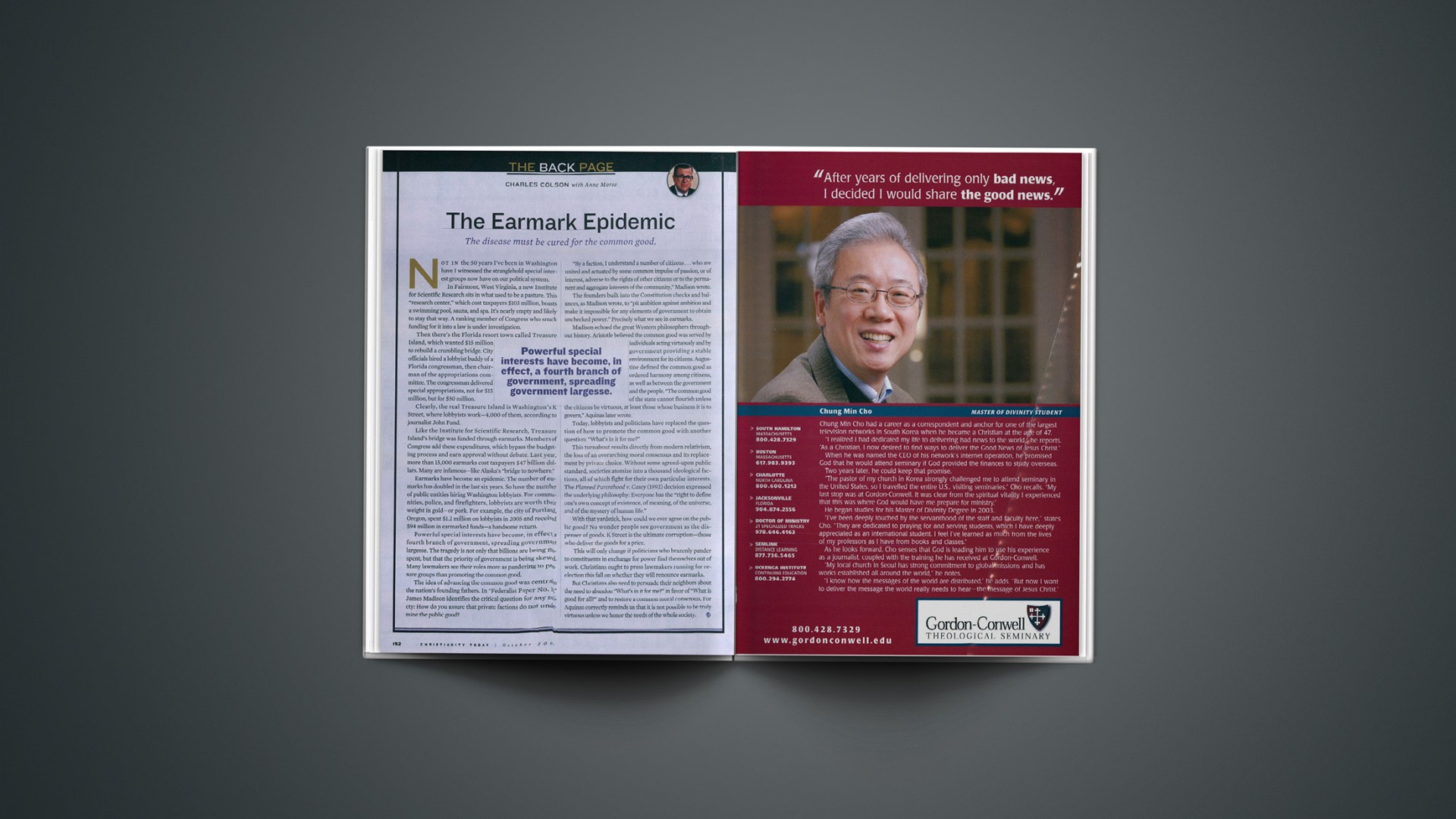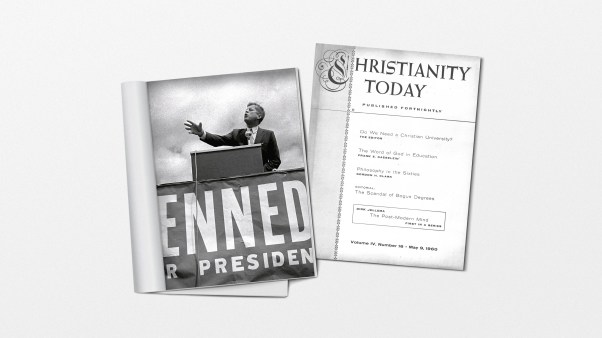Not in the 50 years I’ve been in Washington have I witnessed the stranglehold special interest groups now have on our political system.
In Fairmont, West Virginia, a new Institute for Scientific Research sits in what used to be a pasture. This “research center,” which cost taxpayers $103 million, boasts a swimming pool, sauna, and spa. It’s nearly empty and likely to stay that way. A ranking member of Congress who snuck funding for it into a law is under investigation.
Then there’s the Florida resort town called Treasure Island, which wanted $15 million to rebuild a crumbling bridge. City officials hired a lobbyist buddy of a Florida congressman, then chairman of the appropriations committee. The congressman delivered special appropriations, not for $15 million, but for $50 million.
Clearly, the real Treasure Island is Washington’s K Street, where lobbyists work—4,000 of them, according to journalist John Fund.
Like the Institute for Scientific Research, Treasure Island’s bridge was funded through earmarks. Members of Congress add these expenditures, which bypass the budgeting process and earn approval without debate. Last year, more than 15,000 earmarks cost taxpayers $47 billion dollars. Many are infamous—like Alaska’s “bridge to nowhere.”
Earmarks have become an epidemic. The number of earmarks has doubled in the last six years. So have the number of public entities hiring Washington lobbyists. For communities, police, and firefighters, lobbyists are worth their weight in gold—or pork. For example, the city of Portland, Oregon, spent $1.2 million on lobbyists in 2005 and received $94 million in earmarked funds—a handsome return.
Powerful special interests have become, in effect, a fourth branch of government, spreading government largesse. The tragedy is not only that billions are being misspent, but that the priority of government is being skewed. Many lawmakers see their roles more as pandering to pressure groups than promoting the common good.
The idea of advancing the common good was central to the nation’s founding fathers. In “Federalist Paper No. 10,” James Madison identifies the critical question for any society: How do you assure that private factions do not undermine the public good?
“By a faction, I understand a number of citizens … who are united and actuated by some common impulse of passion, or of interest, adverse to the rights of other citizens or to the permanent and aggregate interests of the community,” Madison wrote.
The founders built into the Constitution checks and balances, as Madison wrote, to “pit ambition against ambition and make it impossible for any elements of government to obtain unchecked power.” Precisely what we see in earmarks.
Madison echoed the great Western philosophers throughout history. Aristotle believed the common good was served by individuals acting virtuously and by government providing a stable environment for its citizens. Augustine defined the common good as ordered harmony among citizens, as well as between the government and the people. “The common good of the state cannot flourish unless the citizens be virtuous, at least those whose business it is to govern,” Aquinas later wrote.
Today, lobbyists and politicians have replaced the question of how to promote the common good with another question: “What’s in it for me?”
This turnabout results directly from modern relativism, the loss of an overarching moral consensus and its replacement by private choice. Without some agreed-upon public standard, societies atomize into a thousand ideological factions, all of which fight for their own particular interests. The Planned Parenthood v. Casey (1992) decision expressed the underlying philosophy: Everyone has the “right to define one’s own concept of existence, of meaning, of the universe, and of the mystery of human life.”
With that yardstick, how could we ever agree on the public good? No wonder people see government as the dispenser of goods. K Street is the ultimate corruption—those who deliver the goods for a price.
This will only change if politicians who brazenly pander to constituents in exchange for power find themselves out of work. Christians ought to press lawmakers running for re-election this fall on whether they will renounce earmarks.
But Christians also need to persuade their neighbors about the need to abandon “What’s in it for me?” in favor of “What is good for all?” and to restore a common moral consensus. For Aquinas correctly reminds us that it is not possible to be truly virtuous unless we honor the needs of the whole society.
Copyright © 2006 Christianity Today. Click for reprint information.
Related Elsewhere:
Colson also criticized earmarks in several recent Breakpoint commentaries, including “Empty Monuments to Human Ego” (May 1, 2006) and “Ethics? Who Needs Ethics?” (Mar. 27, 2006).
Recent Charles Colson columns for Christianity Today include:
Bad Judgment | Ruling imperils faith-based programs around the country (Aug. 1, 2006)
Emerging Confusion | Jesus is the truth whether we experience him or not. (May 31, 2006)
Soothing Ourselves to Death | Should we give people what they want or what they need? (April 5, 2006)
A More Excellent Way | Changing the law isn’t enough. (Jan. 23, 2006)
My Soul’s Dark Night | The best of evangelicalism didn’t prepare me for this struggle. (Dec. 7, 2005)
Machiavellian Morality | One reason teenagers, among others, are jammed in our prisons. (Sept. 22, 2005)
Verdict that Demands Evidence | It is Darwinists, not Christians, who are stonewalling the facts. (March 28, 2005)
The Moral Home Front | America’s increasing decadence is giving aid and comfort to Muslim terrorists. (Sept. 23, 04)
Reclaiming Occupied Territory | The Great Commission and the cultural commission are not in competition. (July 21, 2004)
Societal Suicide | Legalizing gay marriage will lead to more family breakdown and crime. (May 24, 2004)
Evangelical Drift | Outsiders say we’re the status quo. Our call is to prove them wrong. (March 29, 2004)










